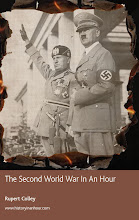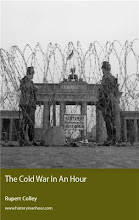World War Two: 68 years ago on February 15, Britain suffered the worst humiliation in its military history - the surrender of Singapore.
The photograph sums it up: General Arthur Percival, the British commander in Malaya, and fellow officers, walking forlornly towards the Japanese commanders to sign the dismal surrender. With their baggy shorts, knee-length socks and tin helmets, one carries the Union Jack, another - the white flag of surrender. Escorting them, three Japanese soldiers, or 'little men' as the British military elite referred to them.
The 'Gibraltar of the East'.
British Malaya was considered a strategic stronghold within the eastern Empire, and the island of Singapore, on the southern tip of Malaya, the 'Gibraltar of the East'. A huge naval defence system had been built during the 1920s facing south out to sea. To the north of the island lay 500 miles of dense Malayan jungle considered by the British to be impenetrable.
"I never received a more direct shock."
But on December 8, 1941, the day after their attack on Pearl Habor, the Japanese landed on the north-west tip of Malaya and from there headed south. Two days later, on December 10, the Japanese sunk two British warships off the east coast of Malaya – the HMS Prince of Wales and Repulse. Years later, Churchill wrote, “In all the war, I never received a more direct shock.”
Bad for morale
However on the mainland, the British were not, at this stage, overly concerned, overestimating the defensive nature of the jungle and underestimating the character of the Japanese soldier. Until early January Percival prohibited the building of defences on Singapore's north coast, believing that to do so would be bad for morale.
But within six weeks of landing in Malaya the Japanese were within striking distance of Singapore. Unaware of how numerically inferior the enemy, an impressive bluff perpetuated by the Japanese, the British and Commonwealth troops panicked at the speed of the Japanese advance, and retreated to Singapore, destroying the causeway between the mainland and the island. The Japanese merely built a new causeway and poured onto the island.
"The honour of the British Army is at stake."
On February 10, Churchill ordered: "The battle must be fought to the bitter end at all costs… Commanders and senior officers should die with their troops. The honour of the British Empire and the British Army is at stake."
But despite Churchill's unusually severe missive, British discipline broke, panic set in, and the cause was lost. On February 15, 1942, the British surrendered.
The myth of the invincibility of the European soldier was shattered and over 80,000 British and Commonwealth troops were to spend the rest of the war in captivity.
Rupert Colley
Read all about World War Two in just sixty minutes at historyinanhour.com
Monday, 15 February 2010
Subscribe to:
Post Comments (Atom)







No comments:
Post a Comment